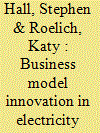| Srl | Item |
| 1 |
ID:
150437


|
|
|
|
|
| Summary/Abstract |
This research investigates the new opportunities that business model innovations are creating in electricity supply markets at the sub-national scale. These local supply business models can offer significant benefits to the electricity system, but also generate economic, social, and environmental values that are not well accounted for in current policy or regulation. This paper uses the UK electricity supply market to investigate new business models which rely on more complex value propositions than the incumbent utility model. Nine archetypal local supply business models are identified and their value propositions, value capture methods, and barriers to market entry are analysed. This analysis defines 'complex value' as a key concept in understanding business model innovation in the energy sector. The process of complex value identification poses a challenge to energy researchers, commercial firms and policymakers in liberalised markets; to investigate the opportunities for system efficiency and diverse outcomes that new supplier business models can offer to the electricity system.
|
|
|
|
|
|
|
|
|
|
|
|
|
|
|
|
| 2 |
ID:
166476


|
|
|
|
|
| Summary/Abstract |
Distributed energy resource technologies (DERs) allow consumers to generate, trade, reduce, and shift their electricity consumption, largely bypassing traditional utilities. DERs can reduce consumer reliance on the grid, and in the most extreme scenario self-sufficient consumers could disconnect from the grid and avoid all external charges. However, since most DERs delivers energy, but not reliable capacity, it would be in the interests of most of these consumers to stay connected to the networks, in the event their system fails. Such a ‘pay as you go’ price scheme would not reflect the opportunity cost of electricity firms' sudden idle infrastructure though
|
|
|
|
|
|
|
|
|
|
|
|
|
|
|
|